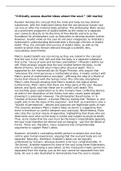Essay
Critically assess dualist ideas about the soul.
- Institution
- OCR
A 40-Mark essay on dualism, from the Soul, Mind and Body topic within the A-Level OCR Religious Studies curriculum. Completed by a student who received A** in RS A-Level.
[Show more]



